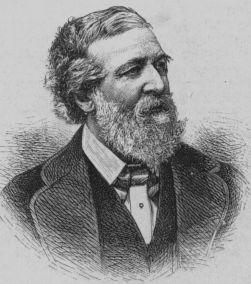Robert Browning Quotes
“Strange secrets are let out by Death
Who blabs so oft the follies of this world.”
Part 2, line 112.
Paracelsus (1835)
By the Fireside, xlvi.
Bartlett's Familiar Quotations, 10th ed. (1919)
The lost Leader, ii.
Bartlett's Familiar Quotations, 10th ed. (1919)
“They are perfect; how else?—they shall never change:
We are faulty; why not?—we have time in store.”
Old Pictures in Florence, xvi.
Bartlett's Familiar Quotations, 10th ed. (1919)
“There's a woman like a dewdrop, she's so purer than the purest.”
Bells and Pomegranates No. V: A Blot in the 'Scutcheon (1843), Act i, scene iii.
“A ring without a posy, and that ring mine?”
Book I : The Ring and the Book.
The Ring and the Book (1868-69)
"The Flight of the Duchess", line 881.
Dramatic Romances and Lyrics (1845)
“Some unsuspected isle in the far seas,—
Some unsuspected isle in far-off seas.”
Part II.
Pippa Passes (1841)
By the Fireside, vi.
Bartlett's Familiar Quotations, 10th ed. (1919)
Luria, Act v.
Bartlett's Familiar Quotations, 10th ed. (1919)
“Oh never star
Was lost here but it rose afar.”
Waring, ii.
Bartlett's Familiar Quotations, 10th ed. (1919)
Luria, Act v.
Bartlett's Familiar Quotations, 10th ed. (1919)
Book XII: The Book and the Ring, line 842.
The Ring and the Book (1868-69)
“A minute's success pays the failure of years.”
"Apollo and the Fates", line 210 (1887).
“In the great right of an excessive wrong.”
Book III: The Other Half-Rome, line 1055.
Source: The Ring and the Book (1868-69)
Book X: The Pope, line 1185.
The Ring and the Book (1868-69)
“That we devote ourselves to God, is seen
In living just as though no God there were.”
Part 1.
Paracelsus (1835)
“When is man strong until he feels alone?”
Act III.
Colombe's Birthday (1844)
Book III : The Other Half-Rome, line 88.
The Ring and the Book (1868-69)
“Sing, riding's a joy! For me I ride.”
Men and Women (1855), The last Ride together, vii.
Abt Vogler, ix.
Bartlett's Familiar Quotations, 10th ed. (1919)
“He who did well in war just earns the right
To begin doing well in peace.”
Luria, Act ii.
Bartlett's Familiar Quotations, 10th ed. (1919)
“It is so horrible,
I dare at times imagine to my need
Some future state revealed to us by Zeus”
From Cleon; regarding death and afterlife
Dis aliter visum; or, Le Byron de nos Jours.
Bartlett's Familiar Quotations, 10th ed. (1919)
“Every joy is gain
And gain is gain, however small.”
Part 4.
Paracelsus (1835)
The Inn Album, iv.
Bartlett's Familiar Quotations, 10th ed. (1919)
“Just for a handful of silver he left us,
Just for a riband to stick in his coat.”
The lost Leader, i.
Bartlett's Familiar Quotations, 10th ed. (1919)
“I count life just a stuff
To try the soul's strength on.”
In a Balcony.
Bartlett's Familiar Quotations, 10th ed. (1919)
“Over my head his arm he flung
Against the world.”
Bells and Pomegranates No. III: Dramatic Lyrics: Count Gismond (1842), xix.
“Be sure that God
Ne'er dooms to waste the strength he deigns impart.”
Part 1.
Paracelsus (1835)
“The curious crime, the fine
Felicity and flower of wickedness.”
Book X: The Pope, line 590.
The Ring and the Book (1868-69)
Stanza xvii.
One Word More (1855)
Rabbi Ben Ezra.
Bartlett's Familiar Quotations, 10th ed. (1919)
Source: Dramatis Personae (1864), Rabbi Ben Ezra, Line 180.
“Womanliness means only motherhood;
All love begins and ends there.”
The Inn Album (1875).
Women and Roses.
Bartlett's Familiar Quotations, 10th ed. (1919)
Instans Tyrannus, vii.
Bartlett's Familiar Quotations, 10th ed. (1919)
“This could but have happened once,—
And we missed it, lost it forever.”
Youth and Art, xvii.
Bartlett's Familiar Quotations, 10th ed. (1919)
"Home-Thoughts, from Abroad", line 14.
Dramatic Romances and Lyrics (1845)
“What I aspired to be,
And was not, comforts me.”
Rabbi Ben Ezra.
Bartlett's Familiar Quotations, 10th ed. (1919)
“Never the time and the place
And the loved one all together!”
"Never the Time and the Place" (1883).
"De Gustibus", line 586.
Men and Women (1855)
Variant: Progress, man’s distinctive mark alone,
Not God’s, and not the beasts’: God is, they are,
Man partly is and wholly hopes to be.
"In a Gondola", line 49 (1842).
